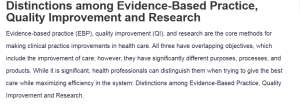Distinctions among Evidence-Based Practice, Quality Improvement and Research
Evidence-based practice (EBP), quality improvement (QI), and research are the core methods for making clinical practice improvements in health care. All three have overlapping objectives, which include the improvement of care; however, they have significantly different purposes, processes, and products. While it is significant, health professionals can distinguish them when trying to give the best care while maximizing efficiency in the system: Distinctions among Evidence-Based Practice, Quality Improvement and Research.
Differences between EBP and QI
EBP and QI are distinct in their focus and purposes. EBP combines three aspects: clinical expertise, patient values, and the best available evidence to inform individual patient care. For example, a clinician would use EBP to answer questions regarding evidence-supported interventions for the treatment of hypertension (Engle et al., 2021).
On the other hand, QI focuses on system-level improvements, such as the standardization of processes to reduce medication errors. EBP focuses on putting into practice the best practices identified through research, while QI is doing what can be done to improve the current processes in specific contexts to advance quality and safety (Connor et al., 2023).
Differences between Research and EBP
The comparison between research and EBP identifies the dichotomy between knowledge generation and knowledge application. The former will seek to create new generalizable knowledge using specific, rigorous methods. These include, among other things, randomized controlled trials (Degu et al., 2022). An example is a study on the effectiveness of a new drug.
EBP, however, takes these findings to a clinical application by critically appraising research and integrating patient preferences and clinical judgment. While research tries to answer broad scientific questions, EBP is used in a more specific manner to address clinical dilemmas by using evidence-informed approaches that are tailored (Degu et al., 2022).
Differences between Research and QI
Research and QI also differ in purposes and methodologies. Whereas research provides generalizable evidence, QI is locally contextual and generates change with localized applicability (Faiman, 2021). Again, research studies usually require huge amounts of time and resources when compared to QI initiatives, which use rapid-cycle methods, like Plan-Do-Study-Act or PDSA, to show immediate effects.
Conclusion
In summary, EBP, QI, and research are related but have distinct roles in healthcare. While research creates foundational knowledge, EBP applies it, and QI refines processes for better outcomes; together, they advance quality and effectiveness in care.
References
Connor, L., Dean, J., McNett, M., Tydings, D., Shrout, A., Gorsuch, P., Hole, A., Moore, L., Brown, R., Melnyk, B., & Gallagher-Ford, L. (2023). Evidence-based practice improves patient outcomes and healthcare system return on investment: Findings from a scoping review. Worldviews on Evidence-Based Nursing, 20(1), 6–15. https://doi.org/10.1111/wvn.12621
Degu, A. B., Yilma, T. M., Beshir, M. A., & Inthiran, A. (2022). Evidence-based practice and its associated factors among point-of-care nurses working at the teaching and specialized hospitals of Northwest Ethiopia: A concurrent study. PLOS ONE, 17(5), e0267347. https://doi.org/10.1371/journal.pone.0267347
Engle, R. L., Mohr, D. C., Holmes, S. K., Seibert, M. N., Afable, M., Leyson, J., & Meterko, M. (2021). Evidence-based practice and patient-centered care: Doing both well. Health Care Management Review, 46(3), 174–184. https://doi.org/10.1097/HMR.0000000000000254
Faiman, B. (2021). Quality improvement projects and clinical research studies. Journal of the Advanced Practitioner in Oncology, 12(4), 360–361. https://doi.org/10.6004/jadpro.2021.12.4.1
ORDER A PLAGIARISM-FREE PAPER HERE
We’ll write everything from scratch
Question 
Address the prompts below with no more than a 1- 2 page paper (not counting references), in APA 7th ed. format; this grade will be factored in with the Weekly Discussion grades for final grading. Remember to use a title page with author info, headings throughout and a reference page. Ask your instructor if you have specific questions.
What are two major differences between evidence-based practice (EBP) and quality improvement (QI)? Between research and EBP? Between research and QI?

Distinctions among Evidence-Based Practice, Quality Improvement and Research
Module 1: Lecture Materials
Online Lecture
This module focuses on comparison of components of EBP, QI/Assurance, translational research, implementation science, and knowledge translation approaches/methods.
Lecture Materials:
Readings:
Levin & Lauder Ch 1-2; assigned video/readings
Articles:
This article is an overview of the history of quality : DNP 805 The history of quality.doc Download DNP 805 The history of quality.doc
This article is an overview of the QSEN competencies: DNP 805 QSEN competencies article.pdf Download DNP 805 QSEN competencies article.pdf
This article is an overview of the National Quality Forum’s nurse sensitive care indicators: National Quality Forum Develops First National Performance Standards for Nursing Sensitive Care.docx Download National Quality Forum Develops First National Performance Standards for Nursing Sensitive Care.docx
Extra Learning Materials:
Video: Chasing Zero: Winning the War on Healthcare Harm
https://www.youtube.com/watch?v=bZ5ccp82YMALinks to an external site.
Video: Dr Mike Evans on QI
https://www.youtube.com/watch?v=nPysNaF1oMw&t=31sLinks to an external site.